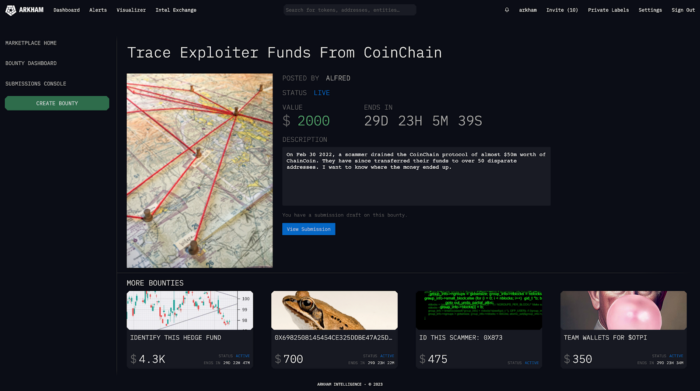The cryptosphere is divided as blockchain intelligence firm Arkham has just launched a groundbreaking new initiative, the Arkham Intel Exchange. Arkham’s unique platform, the first-ever on-chain intelligence marketplace, aims to match individuals or entities seeking insight into specific crypto wallet addresses with those able to obtain it.
While it is undoubtedly a powerful potential defense in the fight against scammers in Web3, the system has already received both massive support and opposition. With Intel Exchange going into effect on July 18, many within the blockchain community have spoken out against the alleged harbinger of centralized doxxing.
The Intel Exchange in a nutshell
The Arkham Intel Exchange stems from two major trends in on-chain analytics. On the one hand, there is a rising demand from traders, investors, journalists and researchers who need detailed analysis of blockchain activity, but do not have the time or expertise to conduct it themselves. On the other hand, there is a growing group of skilled on-chain analysts and researchers looking for ways to monetize their capabilities.
Anecdotally, this gap has been filled by Web3 analytics tools such as DappRadar, CryptoSlam, and tools created through Dune Analytics, as well as other tracking suites. But Arkham hopes so bridge this widening gap with the additions available on its new Intel Exchange.
Arkham’s platform takes a page out of today’s cybersecurity industry and allows users to pay a “bounty” for information by locking money into a contract. These bounties can then be claimed by “bounty hunters” – known as blockchain developers and analysts – who are authorized to provide the requested information in exchange for the payout.
To protect its (mostly) straightforward system, Arkham fines both spam submissions and low-quality bounty responses.

Notably, the launch of the Intel Exchange comes a week after Arkham introduced its native cryptocurrency, ARKM, to Binance Launchpad on July 11. ARKM is an integral part of transactions on the Intel platform as it uses native currency, rather than other crypto tokens, to set up and receive bounties.
In keeping with the theme of exposing information, once a bounty is fulfilled, the party offering the reward will have exclusive access to the information for a period of 90 days, after which the information will become accessible to the wider community from Archam.
Users also have the option to contribute to public bounties by matching the original fund lock to access the data retrieved by a bounty hunter during the aforementioned hold period, otherwise they will of course wait three months for others to access.
A mixed reception
For primary use, Arkham has painted its new Intel Exchange as an invaluable tool in locating say a hedge fund (or from Elon Musk) crypto wallet addresses, identifying a scammer or uncovering the true identity behind a bad actor posing as a high profile person. But despite its potentially groundbreaking nature, it has sparked controversy in the NFT space, with mixed reactions appearing about the metaverse.
Some users have praised the platform’s potential earn money with their research skills, while others have raised concerns about the potential misuse of information and branded it as a “snitch-to-earn” platform. In addition, Arkham’s tagline, “deanonymizing the blockchain,” doesn’t seem to help.
However, in an effort to ensure the security of transactions on the platform, Arkham has stated that all operations on the market will be conducted through smart contracts verified by Web3 security firm Quantstamp. However, it remains to be seen whether this concession will provide any comfort to critics.
Nevertheless, as the world’s first on-chain intelligence marketplace takes off, it will be intriguing to see how the community uses and reacts to the advent as it evolves over time. In any case, Arkham Intel Exchange is likely to face several transparency, privacy, and decentralization challenges well before it becomes a viable and intel-to-earn economy.
Editor’s Note: This article was written by an nft now contributor in collaboration with OpenAI’s GPT-4.


 https://t.co/45i49RzaNa
https://t.co/45i49RzaNa